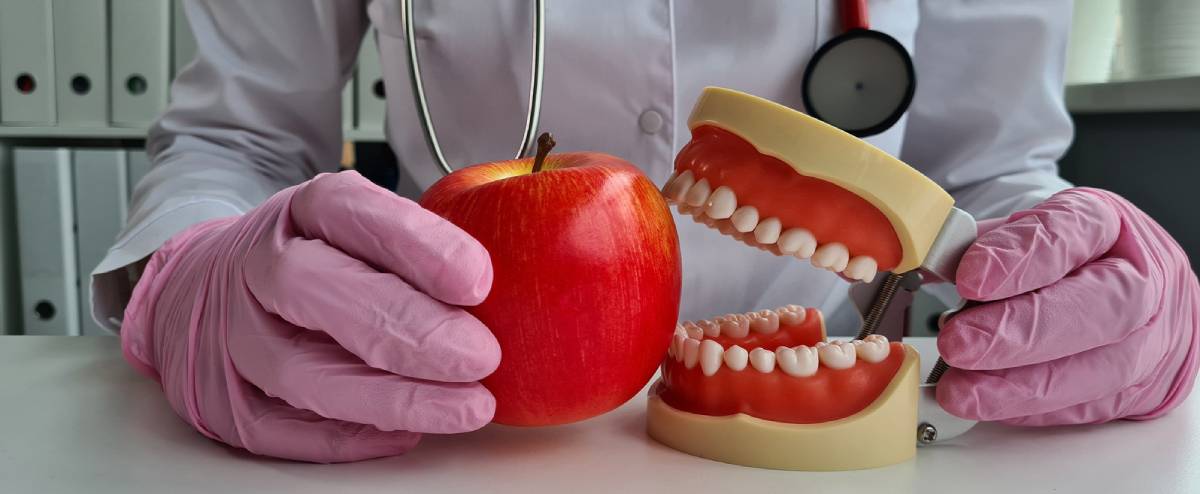Dentures offer a significant improvement to the way patients who are missing natural teeth can speak and eat. They allow patients to come back to a more nutritious and diverse diet. However, it can still be challenging and take some time to get used to eating with dentures. In most cases, patients have to adjust their diet when wearing dentures, especially when the dentures are new. In this article, we will give tips on eating with new dentures.
Why Do You Need a Special Diet with New Dentures
There are several reasons for altering your diet when wearing dentures:
Reduced Biting Force
Even though most dentures are designed to look very similar to natural teeth, they might feel quite different. Our natural teeth have roots that go deep into the jawbone and provide stable and secure support for them. Traditional acrylic dentures are attached to the gums and rely on the roof of the mouth or on the lower jaw bone for support. This method of attachment is usually secure enough, but it still does not provide the level of stability and bite strength our natural teeth do. In fact, traditional dentures can have up to 70% less biting power than natural teeth. This means that some foods, especially hard ones, will be challenging to chew with dentures.
However, the bite force your dentures can provide also largely depends on their type and material . Partial dentures are made of both acrylic and metal and tend to give more biting force. Dentures that are supported by dental implants are the most secure and strong, and patients usually do not have to alter their diet too much, apart from some restrictions, when wearing them.
Dentures Can Get Dislocated
If dentures use suction to attach to your gums or clip to the surrounding teeth, there is a risk of them getting dislodged if you bite down too hard or chew hard food with force. This can be an unpleasant and even painful experience on its own, and it can also cause sores in the mouth. Follow the necessary diet restrictions from the very start and gradually add new foods to your diet. It will help you understand how strong you can bite and what you can and can not chew with dentures without unnecessary incidents.
Increased Salivation
During the adjustment period, when you start wearing dentures, more saliva might be produced in your mouth. Thus, this can cause your dentures to slip around, creating sores in the mouth. Eating soft or liquid foods will decrease the friction in the mouth and reduce the risk of sores.
Tips for Eating With New Dentures
Soft Diet While Your Gums Are Adapting
When you get a set of new dentures, follow a soft and liquid diet for some time before you become accustomed to chewing with them. The Options might include:
- Mashed potatoes
- Puree and soup puree
- Pate, tofu, scrambled eggs
- Yogurt, kefir, soft cheese, cottage cheese, pudding
- Oat or rice porridge
- Fruit and vegetable smoothies (choose the ones that do not stain dentures)
How To Eat With Dentures
- Check the temperature of your food before eating. If you have sores in your mouth, very hot food can be irritating. On top of that, you will not be able to judge the temperature while wearing dentures, but you can still get burned.
- Do not hold liquids in your mouth for a long time to avoid your dentures getting loose.
- Cut your food into small pieces that are easier to chew.
- Consume enough liquid with your meals to make your food easier to chew and swallow.
- Chew on both sides of your mouth to ensure even distribution of pressure to the dentures.
Slowly Introduce New Food Into Your Diet
When you start getting used to your new dentures, you can gradually introduce more and more foods into your diet. If you are not sure what to eat with dentures, find examples of dentures-safe foods below:
- Minced meat and soft cutlets, tofu, omelets, etc.
- Soft fruit, such as bananas
- Steamed, fried, or boiled vegetables
- Whole grain bread without seeds
- Soups and purees
- Pasta
- Hummus, yogurts, and other spreads
- Porridge and cooked grains (buckwheat, rice, etc.)
Foods To Avoid with Dentures
There is also a list of foods that are better to avoid altogether when you are wearing dentures:
- Hard and crunchy foods (raw carrots, apples, hard crackers, popcorn, meat with bones, etc.)
- Sticky foods ( caramel, toffee and other sticky candies, peanut butter, dried fruit, etc.)
- Tough meets can require a lot of force to chew, which puts pressure on the dentures and can result in sores in the mouth.
- Foods and beverages that can stain your dentures (coffee, black tea, sodas, and juices, red wine, berries, candies containing dye).
Make an Appointment Today
Make an appointment with a leading local dentist at My Dentist Upland today if you want to learn more about dentures or adjust or replace the dentures you already have. We are looking forward to welcoming you to our office.

